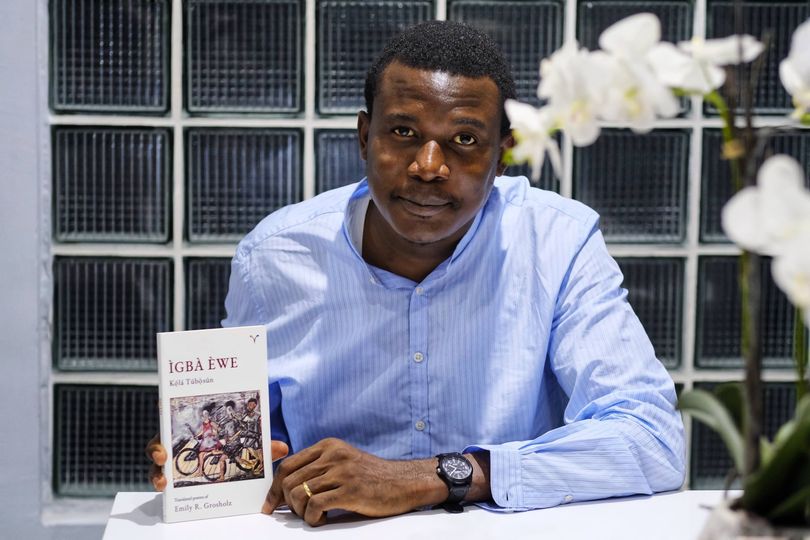Ìgbà Èwe
Printed creative works

Ìgbà Èwe (2021)
Ìgbà Èwe (2021) is a bilingual poetry collection by Kọ́lá Túbọ̀sún featuring original Yorùbá translations of Childhood (2014) by Emily R. Grosholz, an American philosopher and poet.
The book contains twenty-six poems with their English originals, and painting illustrations by Nigerian writer Yẹ́misí Aribisálà.
Support for the publication came from UNICEF and Emily Rolfe Grosholz, and a fixed percentage of the proceeds from the book will go to Nigerian organisations working to support children’s health and creativity in various ways.
Emily Rolfe Grosholz (born 1950 in Philadelphia) is an American poet and philosopher. She is Edwin Erle Sparks Professor of Philosophy, African American Studies and English at the Pennsylvania State University. Her last collection of poetry, The Stars of Earth: New and Selected Poems was published in 2017.
Yẹ́misí Aríbisálà is a Nigerian essayist, writer, painter, and food memoirist. She has been described as having a "fearless, witty, and unapologetic voice" Her work has been featured in the The New Yorker, Vogue magazine, Chimurenga, Popula, Google Arts & Culture, The Johannesburg Review of Books, Critical Muslim 26: Gastronomy, Sandwich Magazine (The African Scramble), The Guardian (UK), Aké Review, and Olongo Africa.

Get the Kindle copy of Ìgbà Èwe on Amazon
Order the Paperback copy of Ìgbà Èwe on Amazon
Get the signed copy of Ìgbà Èwe available on Ebay
Get the copy of Ìgbà Èwe available on Rovingheights Bookstore
Blurbs:
“Kọ́lá Túbọ̀sún is at it again, translating the poetry of Emily Grosholz, childhood, from English into Yorùbá. Translation is the common language of languages. All world literatures have benefitted from it. It is time that we translated the best of world literature into African languages. Kọ́lá has shown the way, into what I call enrichment project. He is among the young practical visionaries of the New Africa.”
- Ngũgĩ wa Thiong’o, Author of The Perfect Nine, translated from the Gĩkũyũ original: Kenda Mũiyũru.
“This is translation in its fullest sense - managing to convey the spirit of a lived world of experience grounded in the landscape, seasons, and culture of Pennsylvania while bringing it into rapport with the imaginative resources of the Yorùbá poetic repertoire. I loved reading across from the English to the Yorùbá versions, because - as with all fine translations - each illuminates the other. Túbọ̀sún's sensitive and sympathetic treatment of the themes of motherhood, childhood and care for others is true to both the letter and the spirit of Emily Grosholz's poems. And it is precisely where there is no exact counterpart that the spark of creativity jumps most vividly across.”
- Dame Karin Barber (DBE, FBA) British cultural anthropologist and academic. London School of Economics.
“Mùṣèmúṣè òǹkọ̀wé tí ó ṣe ògbufọ̀ ìwé ewì Ìgbà Èwe dá múṣémúṣé púpọ̀ nítorí pé kò sọ ẹwà tí ó wà nínú èdè àti àgb́kalè ewì yìí ní èdè Gẹ̀ẹ́sì nù rárá. Dípò bẹ́ẹ̀, ó tún bù kún adùn ewì náà ni nípa ṣíṣẹ àmúlò èdè tí ó yé ni, tí ó rẹwà, tí ó sì kún fún àwòrán.”
- Prof. Àrìnpé Adéjùmọ̀. Poet and professor, Department of Linguistics, University of Ìbàdàn.
“Ìgbà Èwe/Childhood is textual evidence of the possibilities of dialogic transfers when collaboration and creativity merge with commitment. The translator’s ideal is as linguistic as it is cultural, and it is in the province of poetry that such dialogue becomes very graphic. In this collection, the reader is gifted with the translator’s due diligence of creativity, inventive turns and twists of words and phrases, which brings the tonal fluidity of Yoruba language into the heritage, prosody and declensions of the English language.
In that linguistic shuttle, a language wins another audience, its meaning gets disseminated, and the receptive, adaptive language brings a new culture close to the imagination of the new community. The original text is seduced into another text which operates in a new linguistic breath; in that cultural and linguistic transaction, the translator becomes a poet seeking or creating parallels, struggling for clarity even in (the) untranslated, untranslatable moments of transfer.
From author to translator, Emily Grosholz and Kọ́lá Túbọ̀sún have bequeathed to us and our literatures the exemplary art of cultural dialogue across languages, sharing the expressive commonality and currency of childhood consciousness, and extending the frontiers of experiential knowledge, mediated through the lyrical word.”
- Professor Remi Raji, University of Ìbàdàn.
“The tender poetry in Ìgbà Èwe wonders at the sorrows and mysteries of the self, which remains mutable through the passage of time. These meditations on impermanence and innocence record the beautiful uncertainties of what it means to be responsible for the lives of others, and what really changes as the years go by: the world, or ourselves. Túbọ̀sún's Yorùbá translation is delightful and loyal to the original text; singing with the same awe in a new, essential voice.”
- Logan February. Author of In the Nude.
"Bí ìpèníjà kan bá tó ti àwọn ògbufọ̀ tí ń rọ́ ewì láti èdè Gẹ̀ẹ́sì sí ewì ní Yorùbá, èmi kò mọ̀. Ohun tó dájú ni pé Kọ́lá Túbọ̀sún pa kítí mọ́ra o sì gbé Ìgbà Èwe kalẹ̀ gẹ́gẹ́ bì àwòkọ́ṣe fún ọjọ́ iwájú irú iṣẹ́ báyìí."
- Tádé Ìpàdéọlá. Author of Sahara Testaments and The Rain Fardel.
Reviews
On The Politics of Language in Nigerian Literature (October 27, 2021) | Essay by Olajide Salawu
Affirming Poetry Across Cultures (May 23, 2019) | Review by Ayọ̀délé Ìbíyẹmí
Ìrírí Òbí Àti Ìtọ́jú Ọmọ Nínú “Ìgbà Èwe” (August 10, 2021) | Yorùbá review by Rasaq Malik Gbọ́láhàn
The Common Language of Languages (July 24, 2021) | Review by Ari-Ajia Olanrewaju.
Two Poems (January 2005), Sentinel Poetry Quarterly